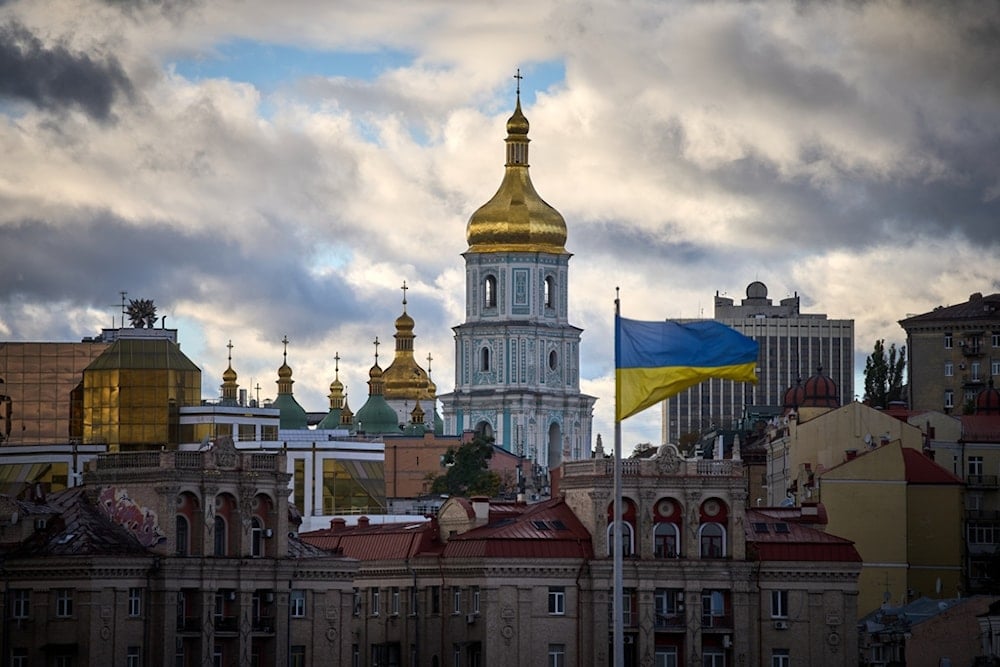Ukrainian Opposition demands full government reset amid scandal
Ukraine faces mounting political upheaval as a sweeping NABU corruption probe linked to the energy sector triggers high-level dismissals, opposition calls to restructure state leadership, and growing international fallout.
-

Ukrainian national flags waves on Independence square against the background of ancient St.Sophia Cathedral in central Kiev, Ukraine, Monday, Oct. 13, 2025 (AP Photo/Efrem Lukatsky)
Ukraine’s political landscape was shaken on Monday as the opposition party Holos urged a sweeping overhaul of state leadership following explosive allegations of corruption in the energy sector. The appeal comes after a series of high-profile raids conducted by the National Anti-Corruption Bureau of Ukraine (NABU), which has expanded into what officials describe as one of the most far-reaching corruption inquiries since the start of the war.
In a statement addressing the unfolding scandal, Holos argued that the current system of governance has become overly concentrated around the president’s office on Bankova Street. "Despite the fact that it is impossible to hold elections under martial law, cleaning up the decision–making centers on Bankova Street [in Kiev, location of Zelensky's office], which, in fact, monopolized all state power, is an urgent need to save the country. This can only be achieved by systematic, consistent steps," the party said.
Holos described the situation as “extraordinary” and warned that failing to respond decisively could have severe implications for Ukraine’s statehood. Among the actions it proposed are the resignation of the current cabinet, the formation of a new government by a parliamentary majority, and the restructuring of key parliamentary committees.
The party further stressed the constitutional issues at stake: "Return to governance of the country in accordance with the constitution. The Ukrainian constitution does not mention either the office of the president as the central body of executive power, or its heads or deputies, to whom the functions of government are delegated. Therefore, the current leadership of the office of the president, starting with its head, needs a complete and immediate reset. This is a key prerequisite for any changes in the political organization of power in Ukraine."
Another major opposition force, European Solidarity, led by former president Petro Poroshenko, also demanded that the cabinet step down and urged immediate talks on forming a new parliamentary coalition.
Ukraine Corruption Upheaval
The political tension follows a major anti-corruption operation announced by NABU on November 10. Investigators revealed images of bags filled with foreign currency and confirmed searches at multiple locations, including the home of former Energy Minister German Galushchenko and the headquarters of Energoatom, the state nuclear energy operator. Ukrainian lawmaker Yaroslav Zheleznyak reported that NABU had also searched the residence of businessman Timur Mindich, known to be close to President Volodymyr Zelensky, noting that Mindich had apparently left the country before the raids were carried out.
Within days, the government dismissed Galushchenko from his post, with Prime Minister Yulia Svyrydenko announcing that an extraordinary cabinet meeting had appointed Deputy Minister Liudmyla Suhak as acting justice minister. The move was followed by mounting criticism from political rivals who accused the president’s circle of overseeing a network of extortion and influence stretching across multiple ministries.
The scandal deepened as NABU detailed a 100 million dollar kickback scheme involving Energoatom, in which suppliers were allegedly forced to pay 10-15 percent commissions in exchange for ensuring payments proceeded. Ukrainian media linked the scheme to Mindich, who reportedly escaped Ukraine via Poland before continuing to "Israel."
Subsequent revelations included excerpts of a recorded conversation involving Mindich, former Energoatom security chief Dmytro Basov, and an adviser to Galushchenko, Ihor Myronyuk. Authorities said Myronyuk attempted to destroy evidence during a search, tearing up documents and throwing them and his phone out a window. Investigators also reported that Myronyuk and his wife held assets and businesses in Slovakia and Bulgaria, and that he had crossed Ukraine’s border 42 times in seven years.
Days later, Zelensky imposed sanctions on Mindich and a financier linked to him. Prosecutors have requested that Myronyuk be detained without bail, or that bail be set at 136.6 million hryvnias (around 3 million dollars).
The scandal has also triggered international tensions. Hungarian Prime Minister Viktor Orban claimed a "wartime mafia network with countless ties to President Zelensky" had been uncovered and accused Kiev of "financial blackmail." Ukraine’s Foreign Ministry rejected the accusations, responding: "Lectures about corruption from a politician who is embroiled in corruption scandals and has made his country the poorest in the EU? No, thanks."
Amid rising domestic pressure, Zelensky ordered sweeping reforms across the energy sector, including a complete restructuring of Energoatom’s management and an urgent draft law to overhaul the National Energy and Utilities Regulatory Commission. Senior officials were instructed to maintain direct coordination with anti-corruption bodies, with the president insisting that "any scheme uncovered in these companies must receive a swift and just response."
The scandal has intensified debates over transparency, constitutional governance, and the distribution of power in Ukraine at a critical moment in the country’s wartime political environment. It has also complicated Ukraine’s EU accession ambitions, with European leaders warning that the credibility of anti-corruption institutions will carry significant weight in upcoming negotiations.
Read more: EU mulls €90Bln loan for Ukraine, separate from frozen Russian assets

 5 Min Read
5 Min Read











